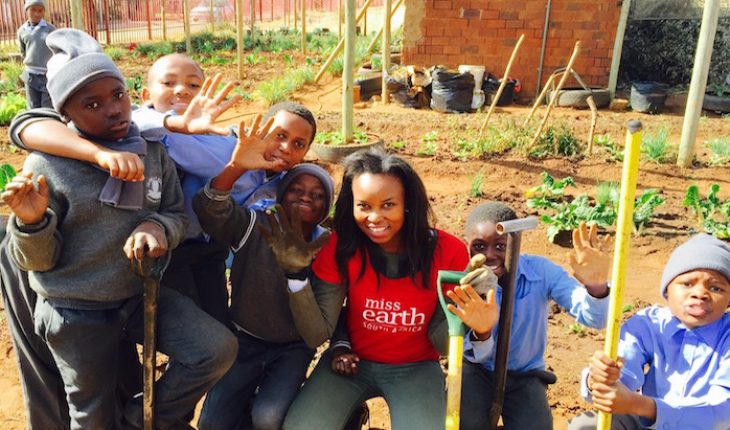This blog originally appeared on The Hippocratic Post.
64 per cent of children under 5 in South Africa go to bed hungry every night. The Department of Agriculture, Forestry and Fisheries in 2015 revealed that 12 million South Africans are “food insecure”.
My interest with food gardens began when my role with Miss Earth allowed me to travel and I witnessed the dire food shortages and increasingly impoverished situations of the learners I encountered during school visits. This was the shocking revelation of a true unjust and unequal society that has been devoured from the inside out. The tragedies of the past have rendered many incapable of fending for themselves and this is precisely the ideology that has fuelled my hunger and fight to re-address the issues of food scarcity that continues to tear communities apart, hindering the young, helpless and malnutritioned, yielding learners that are unable to focus and excel educationally because let’s face it, who can be productive on an empty stomach?
I embarked on this project when I was working as a junior site surveyor on a construction project in rural the Eastern Cape and Limpopo provinces in the year 2013 and it was here that I witnessed first-hand the devastating effects of child hunger and developed a growing concern when I witnessed how desperate little children were when it was lunch time at school as many of them survived on the serving at school since there was nothing from the homes they come from. Here I realized how I can devise my own plan to better this situation and re-introduce the immediate communities I am in close contact with to grow their own food industries.
I decided to draw up a plan to uproot this frustration by re-introducing the communities and homes to subsidiary & micro family farming, in their own back yards and I have not looked back ever since. It has become apparent to me that to solve this crisis we need to shift from the hand out system and move to the self-teaching approach where we leave those we help with the knowledge and means to help themselves in order to break the chain of government dependency and the “we can’t do it ourselves” mentality. South Africa currently faces a drought challenge and it has been indicated that for a large part of South Africa’s population, maize is an important stable, but the price has risen by 150 per cent and experts say this will have a knock on effect.
According to Times Live, Frans van der Bergh, a farmer and president of Agri-Gauteng, believes meat could sharply increase from R40/kg to R80/kg. And because more than half of South Africa’s population lives below the poverty line they will be the ones hardest hit by this food crisis and this is why I have found it critical for me to assume this pivotal role of food awareness teaching and a hands on approach to food and nutrition to completely halt the dependency of the poor on the government. My main targeted focus in 2015 was implementing food security systems AKA food gardens in primary schools across the townships in South Africa, mainly in The Limpopo and Gauteng regions. I intend to grow this work in the other 9 provinces but this time focusing mostly on home improvement to tackle this food problem from its primary source – inactivity and complacency by the local communities.
A five-year study by the University of Cape Town’s African Food Security Unit Network has exposed a food crisis that constitutes a “death sentence” for many and which the government has labelled as “serious”. From observation I have realized that government subsidies are simply not enough and I feel that foreign aid also does not solve the problem but nurses the food crisis symptoms and that can never be enough in a society full of ills and that the only way a nation can truly stand upright and be uplifted is if we all come together, work together and build our own communities up by doing the dirty work first before anyone else can come and assist.
I would like to build a self-sufficient nation which can build and fend for itself. I want people to appreciate the fact that their backyards provide sufficient land to feed themselves as it seems, as Africans we have forgotten the simple ways of the past that used to sustain our livelihood. I would like to take us back to the times of the old where crop was in abundance because food is an important resource necessary to grow a healthy and strong nation.
Thato Romonyai is a One Young World Ambassador working on food security in South Africa.
